Portugal first entered the Eurovision Song Contest in 1964. Since then it has never came close to winning until Salvador Sobral and ‘Amar Pelos Dois’ written by his sister Luísa Sobral scored a runaway victory in Kyiv in May 2017.
In the days following Portugal’s triumph, sources within suggested that host broadcaster RTP implemented its long-standing plan to host the Song Contest in Lisbon. News bulletins confirmed that the likely venue would be the MEO Arena, one of Europe’s largest indoor venues, although unlike recent years, no proposed date for the 2018 Contest was publicly announced.
By the end of May, RTP had come under pressure from politicians and business leaders from other parts of Portugal who wanted an opportunity to host the Contest. Sensitive to complaints about too much centralisation of events in Lisbon, RTP commenced a host city selection process with potential candidates having until the end of June to confirm their interest and make proposals. There are already four confirmed candidates and another two which are also in the process of being submitted.
Setting Requirements And Expectations
On June 13th a delegation from RTP met the EBU’s Eurovision Song Contest Reference Group in Geneva and the Portuguese broadcaster is now working with a set of requirements that any host city will have to meet in order to be in contention to stage next year’s Song Contest. These requirements include a venue which can hold at least 10,000 people and have sufficient infrastructure to facilitate broadcasting and press facilities. The host city also needs to have a sufficient number of hotel rooms, access to an international airport and sufficient funding to support their bid.
It is believed that RTP has earmarked an initial budget of €20m for the Contest, but the broadcaster is looking at making Eurovision at least cost neutral through ticket sales and sponsorship. The desire to have a balanced budget favours venues which need little refurbishment to be ‘Contest-ready’ and have a large capacity in order to maximise ticket revenue.
Where Could We Go?
Local interest in the Eurovision Song Contest has never been higher in Portugal. Already local fans are getting many expressions of interest in attending next year’s Song Contest, suggesting that unlike Kyiv the event, there will be little trouble selling out the venue. It is also believed that the Portuguese tourist board is likely to be involved as the contest offers a huge opportunity to promote one of Europe’s biggest tourist locations.
The four already confirmed host cities are Lisbon, Braga, Santa Maria De Feira and Gondomar. Two other candidates are likely to be confirmed with Portimão and Guimarães entering the process and there is also a rumour that Funchal on the island of Madeira may be preparing a bid.
Lisbon: The MEO Arena
The Portuguese capital remains the odds on favourite to host Eurovision 2018 as it is the only option that clearly meets all the EBU criteria and offers the biggest venue for maximising ticket revenue. While Lisbon has other venues which could stage the contest, nowhere comes close to the MEO Arena. Originally known as Pavilhão Atlântico, it is a multi-purpose indoor arena which has a capacity of 20,000 people. Built in 1998 for Expo ’98 and currently named after its main sponsor, MEO, it would almost certainly revert to its original name for the Eurovision Song Contest.
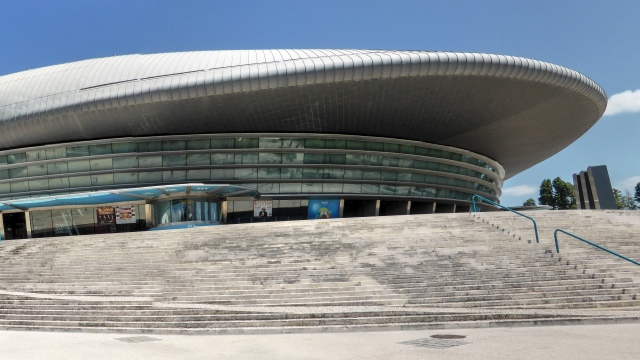
Lisbon’s MEO Arena
The spaceship-like arena, which is actually designed to look like an over-turned boat, offers everything that anyone would ever require for an ideal Eurovision venue. As well as the main concert area, which has staged many big international music acts, sporting events and the famous Web Summit (which was lured away from Dublin in 2016), there are two buildings in the same Parque das Nacoes complex which could work as a press centre and a Euroclub; Sala Tejo and F.I.L. (Feira Internacional de Lisboa). The nearby Oriente station is on the Lisbon metro line and also serves the national rail network. MEO is also close to Lisbon’s international airport and perhaps most importantly for cost saving, close to the headquarters of RTP.
In reality, it is hard to see any alternative venue coming close to MEO Arena in terms of facilities and as a major and growing tourist resort, Lisbon offers more than enough hotel rooms and international flights.
Braga: Parque de Exposições
The mayor of Portugal’s fifth biggest city has made an ambitious proposal to host the Song Contest, suggesting that the currently under construction Exhibition Park could stage the contest. When completed next spring, the concert hall should be able to hold 15,000 people. Other buildings in the complex could be used for press and broadcast facilities.
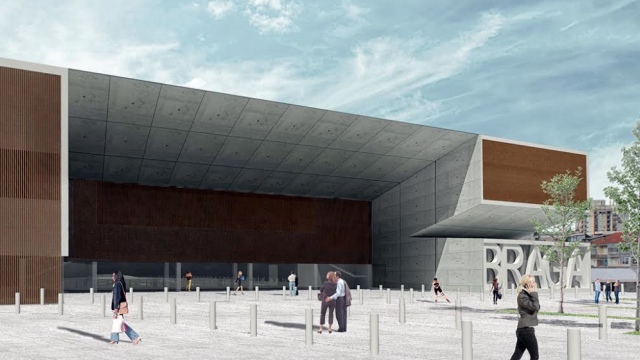
Braga: Parque De Exposicoes
Despite the city’s growing tourism trade and a reputation as a young and lively city, it suffers from two additional challenges on top of not having an already established venue. Braga – which is Portugal’s most northerly major city – is not close to an international airport and it does not have a sufficient number of hotel rooms.
Braga is over 50km from Porto Airport and over 350km from Lisbon, although transport links to both airports are good. Vigo and Santiago airports in North West Spain are also an option but transport links are poorer. Hotel rooms of a sufficiently high quality would be a major challenge and it’s hard to see Braga as a serious contender to host the Contest. Even if you establish a generous radius of 50km, you barely get to 11,000 hotel rooms.
Some media sources have speculated that this bid is more to do with getting publicity for the city and its aspiring mayor than being a serious candidate to host. The city’s mayor Ricardo Rio is seen as the major cheerleader for this bid and the publicity gained from being seen as a Eurovision host candidate will support his political ambitions and help both him and his city gain national and international attention, even if only for a few weeks.
Santa Maria De Feira: Europarque
Santa Maria De Feira is a municipality of 18,000 people, 30km south of Porto and is seen as being the strongest rival to Lisbon to host the Eurovision Song Contest in 2018. The Europarque is a modern congress facility built in 1995 and is part of a complex used to host concerts, conventions, conferences and fairs. The capacity of the main arena is 11,000 people and other buildings in the complex could be used for press and broadcast facilities. While it has a venue, like Braga, Santa Maria De Feira suffers badly in comparison to Lisbon when it comes to hotels and transport infrastructure. The nearest airport is in Porto, but it is on the other side of the city and there are few hotels or indeed anything else of note, bar a landmark castle, in the town of Santa Maria De Feira itself.
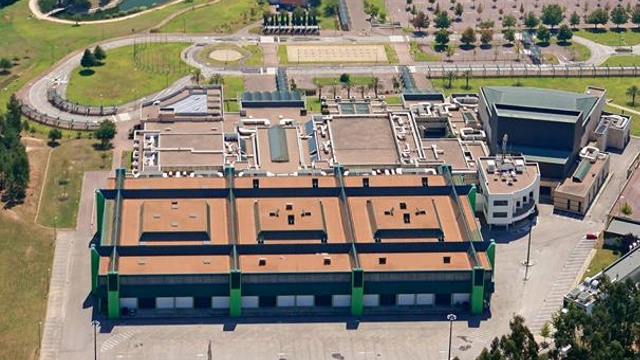
Santa Maria De Feira’s Europarque
The lack of hotels would mean that technical staff, delegations and press would face a long daily commute from Porto or Vila Nova de Gaia to get to the venue. However it is believed that a lot of money and business and political support is behind this bid as the Europarque facility is struggling to attract the business that was originally planned for it.
Again, local politics is playing a major role in this bid. Europarque was removed from the control of AEP, the Portuguese Business Association in 2015, following financial irregularities and handed over to Santa Maria De Feira’s city administration who have struggled to maintain its financial viability. This bid puts Europarque back in the Portuguese press and in a positive light. This bid may be more about getting free publicity for the venue than a serious challenge to host the Song Contest.
Gondomar: Multiusos de Gondomar Coração de Ouro
While it may sound like a location in ‘Lord of the Rings‘, Gondomar is actually a municipality of 170,000 people, 16km to the east of Porto, Portugal’s second city. The distinctive round red multipurpose venue was designed by well-known architect Siza Vieira and completed in 2007. The venue which is predominantly used for indoor sports has a standing capacity of 8,000 spectators but has few surrounding facilities for the Eurovision circus.
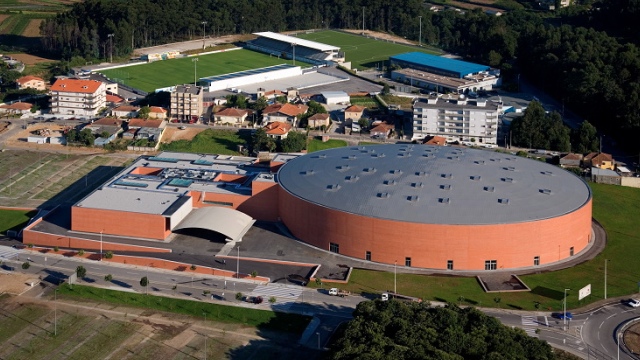
Gondomar’s Multiusos de Gondomar Coracao de Ouro
Gondomar suffers from the same issues as Santa Maria De Feira, having few hotels nearby, meaning a long daily commute from either Porto or Vila Nova da Gaia, although Gondomar is closer to Porto and its international airport. Gondomar is believed to be the preferred bid by politicians and business leaders from Porto (which itself does not have a suitable venue – the Rosa Mota Pavilion in the centre of the city is currently beginning a process of refurbishment which means that it will not be available in May 2018).
Gondomar ticks very few of the necessary boxes to host Eurovision, with a low capacity venue, long commutes from Porto due to the lack of nearly hotel rooms and poor transport infrastructure. However as the country’s second city Porto has to be seen to be interested in hosting all major international events staged in Portugal and there is fierce rivalry between the country’s most affluent city of Porto and the nation’s capital of Lisbon.
Portuguese media and Eurovision fans have speculated that while Lisbon may end up hosting Eurovision, a venue in Porto is likely to be chosen by RTP to host Festival da Canção, the show that select’s Portugal’s entry.
Giumaráes: Pavilhão Multiusos de Guimarães
Another northern city, Guimarães has a population of 160,000 and is 20km, south-east of Braga and 50km, north-east of Porto and its international airport. Guimarães is a very historic city and a former Portuguese capital, with a strong tourist trade. While it has still to officially confirm that it is a candidate to host Eurovision in 2018, sources inside RTP are expecting a bid that uses the multi-purpose Pavilhão Multiusos de Guimarães as a potential venue.
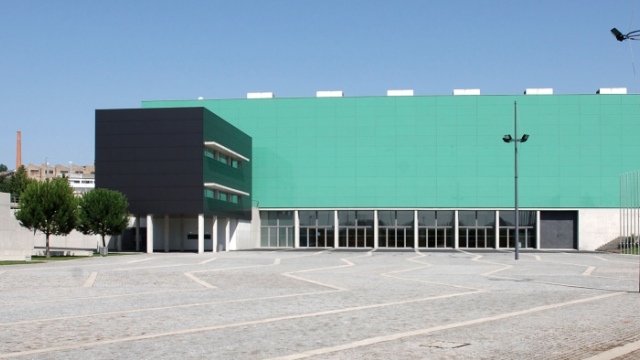
Giumaraes’ Pavilhao Multiusos de Guimaraes
While the venue is ideally located in relation to the city and has a capacity of up to 10,000 spectators – which is likely to be halved once a stage and camera positions are installed – there are some minor press areas in place, but a temporary facility for a proper press centre would need to be built. There are rumours that this bid may include offering the venue for a nominal charge in order to draw the event to the city. A similar arrangement was the deciding factor in Dusseldorf being awarded the 2011 Eurovision Song Contest. However without sufficient hotels and access to an international airport, Guimarães would be a surprise host city and a successful bid may well raise concerns about the ethics and transparency of the host selection process.
Portimáo: Portimão Arena
The city authorities in Portimão in the Algarve in southern Portugal are believed to be preparing a bid to host Eurovision, based on using the city’s recently completed arena as the venue. Portimão is a town of 55,000 people that has become one of Portugal’s biggest tourist resorts in recent years, thanks mainly to its beach area, Praia da Rocha.
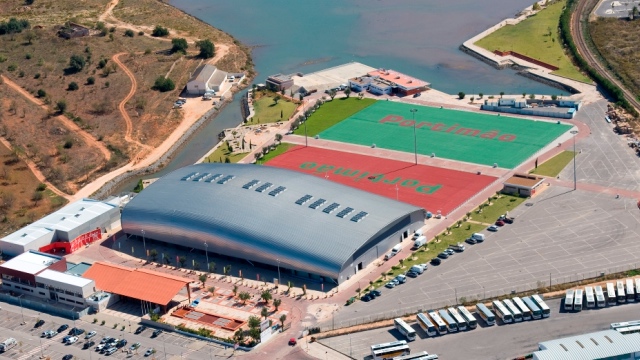
Portimao’s Portimao Arena
Hotels should not be a problem for this bid, due to the town’s tourist trade and its proximity to many other resort towns but Portimão is 66km from the nearest international airport in Faro and the venue is far from ideal. The Sala Algarve hall in the Portimão Arena only has a standing capacity of 8,000 although the complex does have plenty of other facilities for press and technical staff.
Like the Braga bid, this is thought to have more to do with publicising the area than a serious contender to host the event. The city authorities in Portimão have a strong reputation for gaining international publicity and this bid would show that there’s more to the city than beaches and sun based entertainment.
Everyone Has The Right To Be Considered
When you look at the shortcomings of the rival bids, it is hard to see any real alternative to Lisbon. The MEO Arena is an ideal venue for the Eurovision Song Contest and Lisbon has everything needed to be the perfect host city. It would therefore be a huge shock if the Song Contest went elsewhere. However RTP wants to be seen as seriously considering other options and not being Lisbon-centric.
Sources well-placed in RTP suggest that as a consolation for not getting to host the Song Contest, one of the other candidate cities will be selected to host Festival da Canção, the national selection to choose Portugal’s entry, with the Porto area likely to be preferred. RTP is expected to announce the Eurovision host city, the date for the contest and preliminary details of Festival da Canção in the near future. For its 2018 entry, it is likely that RTP will repeat the formula that brought success in 2017, with invitations to prominent Portuguese songwriters.
What About The Hosts?
While it waits from the completion of the host city process, RTP is also looking at other details of the 2018 Contest. Actress and TV presenter Catarina Furtado is believed to be the favourite to present the contest. Catarina is a well-known face on Portuguese television and co-hosted the final of Festival da Canção in March. She has perfect English, having studied acting in London. Whether she presents the Song Contest alone or with a co-presenter is still not decided.

Katarina Furtado
Press speculation in Portugal suggests that RTP may also approach footballer Cristiano Ronaldo and Portuguese-Canadian singer/songwriter Nelly Furtado to play an on-air role, while it is known that the broadcaster is already seeking suggestions for Eurovision interval and opening acts.
While there may not be a lot of officially confirmed news so far, RTP is already working hard on next year’s Eurovision Song Contest.










I find it remarkable that we still don’t know the dates for 2018.
Usually at the end of the contest, you have an idea about the dates for the next contest. For some reasons EBU din’t/couldn’t make a decision on this matter.Very strange…
I hope RTP sticks with Lisbon and MEO for Eurovision and give one of the other cities a week of Festival da Cancao in a smaller arena with a strong lineup of bigger Portuguese talent…I hope the Portuguese music community sees the success of Salvador on the charts, hears Luisa’s positive experience with RTP/ESC and likes the idea of representing the country on home soil enough to have an even better Festival da Cancao that builds on last year’s success
Shai, I think the easiest answer is probably correct, the potential host countries during the second week all had different preferred dates so it couldn’t be ‘confirmed’ beforehand. With RTP moving to a bidding process, the date has to stay unconfirmed until a winning bid.
Ewan – At the risk of sounding a bit dumb, I never thought the EBU even consult the potential host country(ies).
But after hearing about the EBU decision to fine UA:PBC, I think they simply didn’t have any time to think about 2018’s contest.
It was such a chaos and they have to keep their head above water. The last thing in their mind was to pick up the dates for 2018.
If I’m not mistaken, they didn’t even had their regular press conference, they have during the 2 weeks up to the final.